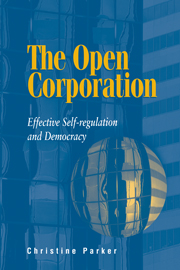Book contents
- Frontmatter
- Contents
- List of tables and figures
- Preface
- Acknowledgements
- 1 Introduction: Corporate self-regulation in the new regulatory State
- 2 The potential for self-regulation
- 3 Motivating top-management commitment to self-regulation
- 4 Cultivating self-regulation leadership
- 5 Self-regulation methodology and social harmony
- 6 The pathologies of self-regulation
- 7 Model corporate Citizens: The role of self-regulation Professionals
- 8 The three strategies of ‘permeability’ in the open Corporation
- 9 Meta-regulation: The regulation of self-regulation
- 10 Conclusion
- Appendix: Methodology
- Notes
- Reference
- Index
10 - Conclusion
Published online by Cambridge University Press: 05 July 2014
- Frontmatter
- Contents
- List of tables and figures
- Preface
- Acknowledgements
- 1 Introduction: Corporate self-regulation in the new regulatory State
- 2 The potential for self-regulation
- 3 Motivating top-management commitment to self-regulation
- 4 Cultivating self-regulation leadership
- 5 Self-regulation methodology and social harmony
- 6 The pathologies of self-regulation
- 7 Model corporate Citizens: The role of self-regulation Professionals
- 8 The three strategies of ‘permeability’ in the open Corporation
- 9 Meta-regulation: The regulation of self-regulation
- 10 Conclusion
- Appendix: Methodology
- Notes
- Reference
- Index
Summary
Self-regulation and legal regulation
Corporate self-regulation is necessary to democracy It is neither naive optimism nor a concession to market power to advocate reliance on corporate self-regulation as a matter of policy We have no choice but to inquire into the conditions in which corporate self-regulation will occur effectively, because there will be no legal or socially responsible action by corporations if there is no self-management of responsibility. It is corporate management that will ultimately determine corporate compliance or non-compliance with social and legal responsibilities.
As a matter of fact, the new regulatory State is increasingly experimenting with deregulation and regulatory reform to work more ‘naturally’ in partnership with markets, business and other private interests. Regulatory compliance programs and voluntary self-regulation Systems are increasingly popular with management as a means to manage legal and social responsibilities. I have proposed an ideal type of ‘permeable’ self-regulation as an explanation for how self-regulation can work, and as a normative ideal for companies, regulators and stakeholders. But mine is an ideal of self-regulation that is not purely self-regulation at all. Rather, it is a marriage between law, corporate self-management and external stakeholders.
Corporate management should be open to a broad range of stakeholder deliberation about values; and legal regulation should facilitate (and enforce) their permeation. In the open Corporation, management self-critically reflects on past and future actions in the light of legal responsibilities and impacts on stakeholders.
- Type
- Chapter
- Information
- The Open CorporationEffective Self-regulation and Democracy, pp. 292 - 301Publisher: Cambridge University PressPrint publication year: 2002
- 1
- Cited by



